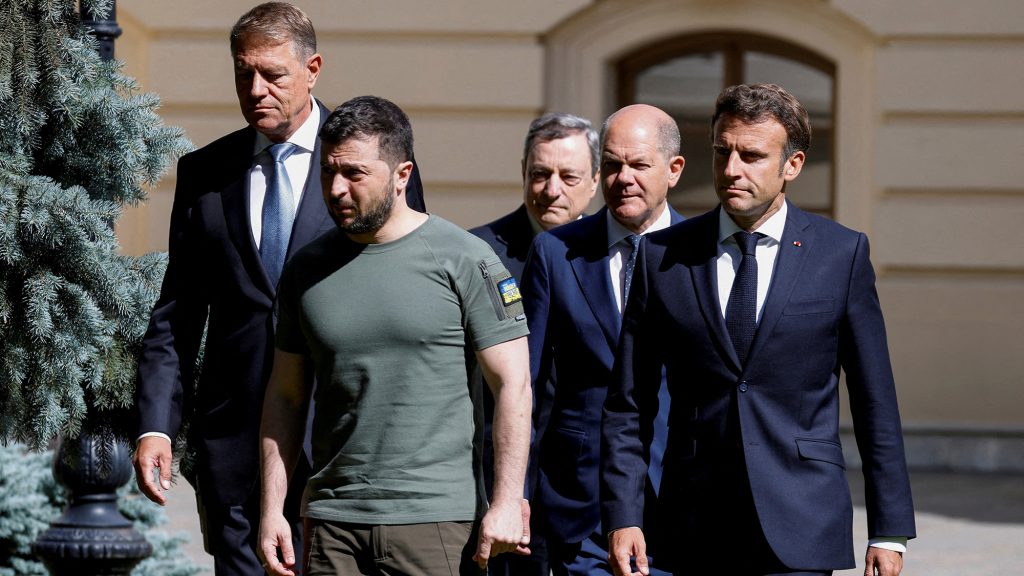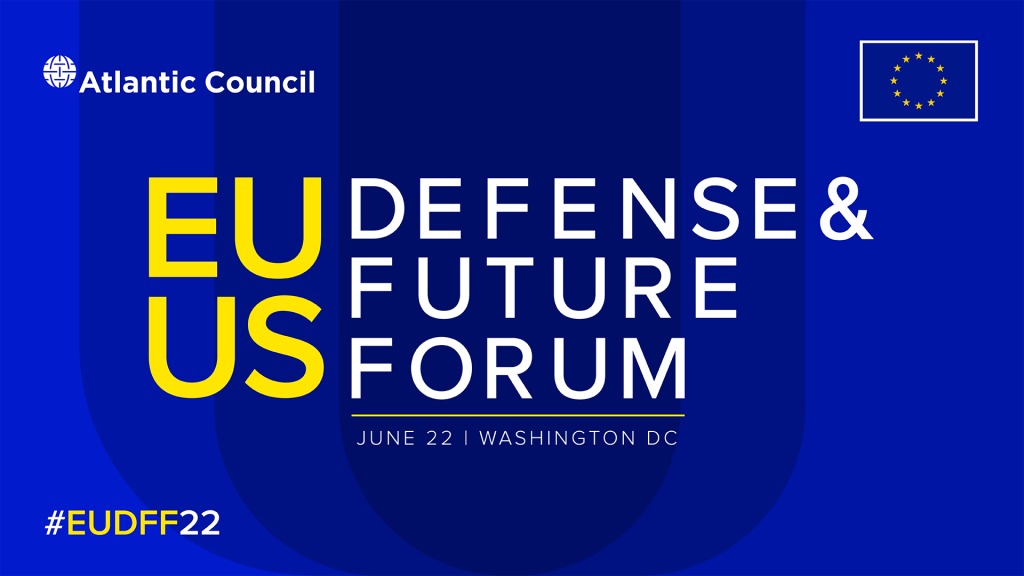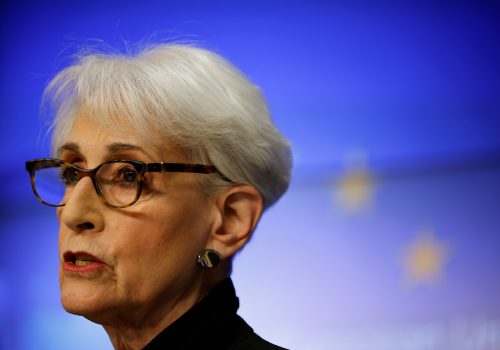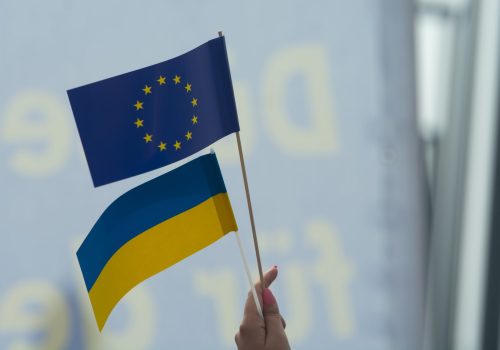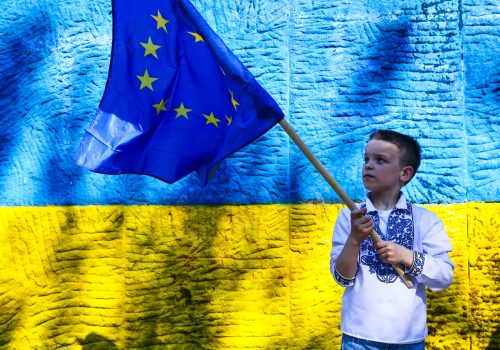Watch the full event
As European heads of state deliberate this week over whether to give Ukraine candidate status in its efforts to join the European Union (EU), Secretary General of the European External Action Service Stefano Sannino said: “I feel comfortable and I feel optimistic saying that the decision will be a positive one,” though he didn’t want to get ahead of “our political bosses.”
Sannino appeared with US Deputy Secretary of State Wendy Sherman for a keynote address at the Atlantic Council’s EU-US Defense & Future Forum on Wednesday, ahead of the EU summit beginning Thursday, where Ukraine’s membership tops the agenda. While Sannino declined to confirm the decision either way, he did say giving Kyiv candidate status “would be a very strong signal to the people of Ukraine in this specific moment, where they need to be reassured of the fact that they will be where they choose to be.”
Sherman, Sannino’s frequent colleague in coordinating the response to Russian President Vladimir Putin’s war of aggression against Ukraine, said the EU move comes as part of a larger diplomatic and military effort to force Putin to back down from his invasion.
“This is about Vladimir Putin making a choice that is good for the security of his country and the security of the world,” Sherman said, noting that the Group of Seven (G7), NATO and European Union meetings over the next week will consider “whatever we can to encourage him to make the right choice here.”
Sherman and Sannino discussed the possibility of a Russian nuclear response, Chinese technology, and efforts to end Europe’s energy reliance on Moscow, among other topics in a conversation with PBS NewsHour’s Nick Schifrin during the event hosted by the Delegation of the European Union to the United States, in partnership with the Atlantic Council’s Europe Center.
Here are some more highlights from their conversation.
How will Russia respond?
- With last week’s billion-dollar influx, the United States has sent more than $5.6 billion in security assistance for Ukraine since the invasion began February 24, with Congress authorizing $40 billion in total aid. The EU this week is set to approve a $9.5 billion loan package. But both Sherman and Sannino pressed the point that Ukraine, not its Western patrons, is making the decisions about its future as the war continues on. “If you see also the conclusions of our European Council, we are not even making any reference to any kind of peace settlement because we want to make it clear that we are not pushing in any possible way Ukraine to take decisions that they think that they are not ready for,” Sannino said.
- Asked about potential escalations by Russia in response to Ukraine’s EU path, Sherman said Putin should “think more than twice” about any such escalation. “The world is watching,” she said, and he has already misjudged his opposition once: “He wanted a weakened NATO; he has a stronger NATO. He wanted a weakened European Union; he has a stronger European Union.”
- Sherman criticized Putin’s claims that NATO (“a defensive organization,” as she put it) and Ukraine were threats to Russia, given its permanent United Nations Security Council seat, large nuclear stockpile, and considerable resources. “Putin is being sidelined across the world as someone not to do business with,” she said, noting the contraction of the Russian economy. “His people are suffering.”
Economic aftershocks
- When asked about Europe’s continued reliance on Russian energy, Sannino pointed to an already-passed EU resolution in which leaders promised to reduce their oil and gas imports. “This is not something that can be done overnight. Otherwise, I mean, the risk of a collapse of the economies will be there,” he said, but he maintained that the reduction will be carried out over time.
- In the meantime, the EU faces a challenging balancing act between its desires to reach energy independence and end reliance on fossil fuels. Sannino mentioned that France, the United States, and even some Gulf nations had found success adopting alternative sources. The commitment to a green transition won’t change, but nations may have to use less climate-friendly options (such as reviving old coal plants) to meet their capacity needs amid the Russia conflict.
Looking further afield
- In discussing the challenges presented by Chinese technology, Sannino touted the US-EU Trade and Technology Council as one response by the West to keep up in the tech arms race. “We think there are also areas where we can cooperate, but we will not shy away when it will come to confronting decisions or choices that are not in the interest of our countries,” Sannino said.
- Sherman said countries should remain “eyes open” on investment screening and imports, and cognizant that technology could be used by hostile nations for surveillance or to gather data to gain an unfair advantage. The conversation came amid reports that US President Joe Biden is considering lifting Trump administration tariffs against China to help curb inflation. “Tariffs should be strategic, and that’s certainly what we’re looking at,” she said.
Nick Fouriezos is an Atlanta-based writer with bylines from every US state and six continents. Follow him on Twitter @nick4iezos.
Watch the full event
Further reading
Wed, Jun 22, 2022
Wendy Sherman and Stefano Sannino on Ukrainian EU membership, Russian escalation, and Chinese technology
Transcript By
US Deputy Secretary of State Sherman and European External Action Service Secretary-General Sannino joined the Atlantic Council to talk about the transatlantic relationship and the roles of the European Union and United States in addressing the world's challenges.
Tue, Jun 21, 2022
What would EU candidate status mean for Ukraine?
UkraineAlert By Peter Dickinson
Ukrainians expect the country to be granted official EU candidate nation status at this week's summit of European leaders but what would this mean for Ukraine's broader ambitions for greater Euro-Atlantic integration?
Sun, Jun 19, 2022
EU candidate status for Ukraine is the ideal response to Russian aggression
UkraineAlert By Diane Francis
European Union leaders must decide this week whether to grant Ukraine official EU candidate nation status. This is a critically important moment for Ukrainians that will also shape the future direction of the entire continent.
Image: Romanian President Klaus Iohannis, Italian Prime Minister Mario Draghi, Ukrainian President Volodymyr Zelenskiy, French President Emmanuel Macron and German Chancellor Olaf Scholz arrive for a news conference in Kyiv, Ukraine on June 16, 2022. Photo via Ludovic Marin.
